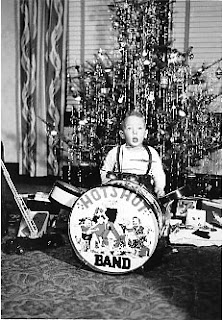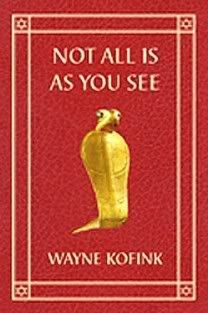GHOSTS OF CHRISTMAS PAST, PART 4
 When we were very young, there was no churchgoing on Christmas eve. We went home, argued about cookies for Santa Claus, and went to bed. Later, Mom started singing in the choir. We would be brought home and placed under the care of Grandma Kofink while Mom and Dad went off to church. Something very mysterious went on at church, because I saw the evidence the next day. Two small candles, sort-of pinched in the middle like an hour glass with a circle of cardboard around it, appeared on the kitchen table. I would finger the candles trying to imagine what it was all about. Then one year I was old enough to go to church, too. I sat with Dad while Mom was in the choir-loft. I don't know whether they left my sister at home or if she just fell asleep in the pew. The church was absolutely packed. They had to put up folding chairs in the aisles. The most impressive sight was the huge, huge Christmas tree in the front of the church. Of course I had seen the tree when I was in Sunday School, but I had never seen it at night, especially when they turned down the lights for the sermon. For once in my life I had something to do while the pastor preached. There were hundreds of lights and ornaments to look at. Most of them were different from what we had at home. The tree was decorated by the LOYALs each of whom brought two ornaments to add to the tree each year. This went on until one year the Scrooges at City Hall succeeded in getting real trees banned from churches.
When we were very young, there was no churchgoing on Christmas eve. We went home, argued about cookies for Santa Claus, and went to bed. Later, Mom started singing in the choir. We would be brought home and placed under the care of Grandma Kofink while Mom and Dad went off to church. Something very mysterious went on at church, because I saw the evidence the next day. Two small candles, sort-of pinched in the middle like an hour glass with a circle of cardboard around it, appeared on the kitchen table. I would finger the candles trying to imagine what it was all about. Then one year I was old enough to go to church, too. I sat with Dad while Mom was in the choir-loft. I don't know whether they left my sister at home or if she just fell asleep in the pew. The church was absolutely packed. They had to put up folding chairs in the aisles. The most impressive sight was the huge, huge Christmas tree in the front of the church. Of course I had seen the tree when I was in Sunday School, but I had never seen it at night, especially when they turned down the lights for the sermon. For once in my life I had something to do while the pastor preached. There were hundreds of lights and ornaments to look at. Most of them were different from what we had at home. The tree was decorated by the LOYALs each of whom brought two ornaments to add to the tree each year. This went on until one year the Scrooges at City Hall succeeded in getting real trees banned from churches. As spectacular as the tree was, it couldn't compare to the final ritual to the service. All the lights were turned off in the church. The pastor carried a lighted candle down to the front of the church and lit the candles of the ushers. They in turn let the candles of the first person in the pew, who then passed the light down the pew. Gradually the whole church was bathed in the glow of lighted candles. (I remember once one guy getting impatient waiting for the light to be passed down the pew, so he whipped out his Zippo lighter and lighted his candle and his wife's candle. He leaned over to pass this spurious flame over to Dad. Much to his surprise, Dad pinched-out the candle flame between his fingers. Don't ever mess with church traditions around Dad.) When the candles were lighted, the congregation sang "Silent Night." At the end of the hymn, people would quietly walk out of the church carrying this light into the dark night. It was a wonderful experience–a hundred lighted candles, a hundred voices softly singing. Unfortunately, Andy and Clyde, the ushers, decided that this would be a good time to start folding up the extra chairs to get them out of the way. These chairs were ancient, like most of the stuff in the church, and it took a lot of muscle to get the seats up, the legs in, and then to jam them in the rack. The effect was devastating: "Silent night," CRREEEK! RATTLE, RATTLE! "holy night" WHAM! CRASH! "All is calm" BANG! CLUNK! "all is bright." KABOOM! While all this was going on, a mystery was revealed to me as the small candle began to soften from the warmth of my hand. The middle began to pinch-in forming the peculiar hourglass shape of the candles I had discovered at home.
At some point we all started singing in the choir. This was probably not the best idea in Dad's case since he was somewhat tone deaf, but it was all well meant. Our Aunt Martha and cousins Adele and Darlene also sang in the choir. Dad's brother, Uncle Herb, didn't join because he was even more tone deaf than Dad. Dad just had trouble coming close to the right pitch. Uncle couldn't get the notes to go in the right direction. Anyway, this helped to make Christmas eve services a family occasion. In my mind we must have sung about a dozen anthems and carols at these services. I didn't complain, because it was a great time. A new choir director, Ruth, added her own shaping to the traditions. The tradition was that the choir continued to sing "Silent Night" as people shuffled out of the church dripping hot wax on the floor and on one another. Ruth thought we needed some variety, so at some point during the singing she would lean over a whisper to the choir, "hum." And we all hummed a stanza. Then maybe she play a verse on the chimes without any singing. Then, near the end she would whisper, "auf Deutsch," and we would sing in German, at least those who knew German did. One year I wrote the German text out on a slip of paper so I could be sure to get the words right, but I didn't realize how hard it was to read a foreign language by candlelight. It could have been written in Swahili for all the good it did me. The year Aunt Margaret came to visit we brought her to church. She was taken by the organ music since in her little town all they had was a violin and an accordion at church. Unfortunately, by this time we had a new pastor who hated whatever had been the traditions of the past, and he banished the singing of "Silent Night" at the end of the service. I found this most disappointing because I knew the only thing Aunt Margaret would be able to understand would be the German "Stille Nacht." When the service was over, I got Ruth to sing it for her. Aunt Margaret appreciated it, but it wasn't quite the same. Some things are good enough as they are and don't need changing to make them better. Singing "Silent Night" and holding lighted candles is one of them.
In this festive season of Christmas, May the Lord God bless you on your way and greet you on your arrival.Wayne






